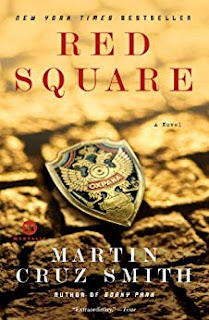Of the
several reasons Arkady Renko is my favorite fictional Russian
detective, I almost hate to admit the prime one is his name:
easy to pronounce and easier to spell than, say, "Sheremetyevo"
or "Porfiry
Petrovich." Russian
language issues might also be why
Martin Cruz Smith in Red
Square
refers to his characters mostly by their first names, as it would
hardly do to call Arkady Renko "Renko" and then be stuck
with interminable,
tongue-twisting surnames
for everyone else. It could simply be a cost-saving measure—less
ink, fewer pages, not so
prone to typos.
Okay,
that's my facetious argument
for preferring Arkady over all of the other Russian detectives, none
of whom come to mind at the moment. More maturely, my sentiment
concurs with Christopher Lehmann-Haupt's in his New
York Times review
of Red
Square,
that "poor
put-upon Arkady is so doggedly honest and unassuming."
How can we
not like a guy who makes fun of himself? Like this:
"Arkady had left Polina and hurried home in time to catch
Irina’s first broadcast. Drinks with one woman, then rushing to the
voice of another. What
a sophisticated life,
he thought." And this:
"Arkady
caught another glance of himself in the bar mirror. Grimmer than he
thought, not the kind of face that woke up expecting sunshine."
Grim,
yes, he’s Russian. Yet,
there is
no stereotypical crying in his vodka.
He keeps plodding forward, brushing negatives aside with a
self-effacing appreciation of irony. He’s
a
hopeless but stubbornly stoic romantic. A realist with innocent
dreams he shares with no
one but
us.
In this,
his third outing of the series' seven, Arkady is back in Moscow at
his old job investigating crime, for a
new city
prosecutor. He'd gotten in deep doodo investigating a triple murder
in Gorky
Park,
and was banished to Siberia, where state authorities tortured him
(unsuccessfully) to rat out his lover, Irina, whom he'd helped escape
to the U.S. Meanwhile, he lived on menial jobs in Siberia's freezing
weather. He worked outdoors as a guard, labored in a reindeer
slaughterhouse, and spent a year gutting fish on a Soviet factory
ship in the North Pacific (setting of Polar
Star,
second in the series).
But the
political winds have shifted in his absence, the government has lost
control of the economy to thieves and gangsters, and the ruble has
become a joke along with Communist Party slogans. People line up to
buy everything from beets to black market trinkets. They buy anything
they can afford, just to be able to buy something. They pay three
rubles for a dead light bulb, for example:
“Why,
when a new bulb was forty kopecks? Since there were no new light
bulbs for sale in the stores, you took this used bulb to your office,
replaced the bulb in the lamp on your desk and took the good bulb
home so that you wouldn’t live in the dark.”
Arkady sums
things up with a line the poet Mayakovsky wrote in happier times:
“
‘Regard me, world, and envy:
I have a Soviet passport!’ Now everyone just wanted a passport to
get out, and the government, ignored by all, had collapsed into the
sort of spiteful arguments that erupted in a whorehouse where no
customers had come to call in twenty years.”
He feels
at times that while he was in Siberia, “God...lifted Moscow and
turned it upside down. It was a
nether-Moscow he had returned to,
no longer under the gray hand of the Party.”
Things heat up for Arkady
moments after he visits an informant, a popular underworld banker, at
a Moscow construction site where a major black market is doing
business. The informant’s car blows up burning its occupant to
death and incinerating all of his cash and papers. Arkady’s
investigation soon gets him snarled once again with authorities, but
with pit bull tenacity he persuades his boss to send him to Germany
following a clue he stumbled upon in the victim’s apartment.
The clue is
a fax from Munich asking simply, “Where is Red Square?” The
question initially seemed silly, as everyone knows where Moscow’s
Red Square is located. But Arkady learns the reference is
to the famous Malevich painting, “Red Square,” worth millions and
believed to have been smuggled out of Russia. He’s
soon in trouble not only with
his boss, the
Soviet consul,
and German police, but
becomes a
target of Chechen gangsters, who, we are told, are “the
Sicilians of the Soviet mafias.”
Even
his love life gets tortured in the scrambled ideologies of the time.
Irina, the woman he rescued in Moscow and helped escape to New York,
and then protected under torture in Siberia—altho he’d lost touch
with her and had no idea where she was—is now an announcer for the
Munich-based Radio Liberty, a U.S. owned propaganda station staffed
by Russian émigrés and defectors. Arkady had religiously followed
her daily broadcasts and, of course, looked her up when he arrived in
Munich—much to his dismay. In a scene that carries the poignancy of
Zhivago and Lara, she cuts him cold:
It was funny; in interrogation
he had been naked, hosed down, insulted and hit, yet he had never
felt as embarrassed as he did at this table. Besides being badly
shaved, his stupid face was probably beet-red, he thought, because
the evidence seemed to be that he was crazy. Evidently he had been
crazy for years, imagining a connection between himself and this
woman, who clearly shared no similar memory at all. How much had he
imagined—their time hiding in his apartment, the shootings, New
York? At the psychiatric isolator, when the doctors injected
sulfazine into his spine, they used to say that he was crazy; now,
over beer, it turned out that they had been right. He looked at Irina
for any response, but she had the equanimity of a statue.
“I
want to see you again,” Arkady said in spite of himself.
Irina studied him. “No, what
you want is for me to say that I’m sorry if you suffered on my
account. Arkady, I am sorry. There, I said it. I don’t think we
have anything else to say.” With that she left.
I
cannot take issue with Lehmann-Haupt’s impression
of the novel’s conclusion, nor can I improve upon it. And as I am
running out of gas myself, I’ll just give it to you here:
“If
the beginning of ‘Red Square’ is too slow, the ending is too
busy. It's meant for the rapid shifts of film, not the less visual
perspectives of prose. At the end of the novel, the August military
coup is inevitably unleashed, and its effect on the story is a little
as if ‘Crime and Punishment’ were suddenly to burst into
newsreel.”
But
this observation of the standoff that ended with Gorbachev’s
abdication, if true, is a breath of fresh air from the despair that
led to it:
“Everywhere
was a common look of astonishment, as if they had all ventured
individually to drop their lifelong masks and show their faces.
Middle-aged teachers, muscular truck drivers, wretched apparatchiks
and feckless students wandered with expressions of recognition. As in
I know you. And among all these Russians, not a bottle. Not a one.”
Stay
tuned for Polar Star
next week.




Late change has me doing the list of FFB for this week...
ReplyDeleteMy gratitude...and sympathies.
DeleteYou are reminding me why I want to read the latest two books in this series, and then perhaps reread some of the earlier ones.
ReplyDeleteI'm reading them in order now, Tracy, so it will take me a while to get to the last two. Now I'm wondering if he's finished with Arkady.
DeleteI do remember the good old days of pre-menstrual rage and aggravation. But silly me, I thought it went with the territory. Too much information? Yeah, probably. I'm glad science may finally be playing catch-up. If it were men going through it this it would have been solved pronto years ago. We ALL know that. But I still don't think I want to read a book about this sort of thing. At my age, I might succumb to some old lady post menstrual rage. (TMI, Yvette!) I like Megan Abbott's work though I've only ever read one book of hers. It stayed with me though. Not too many books do.
ReplyDeleteYou do realize there's no statute of limitations on murder, Yvette? I've just posted my review of Megan's book, btw--her best one yet, IMO. http://mdpaust.blogspot.com/2018/07/give-me-your-hand-megan-abbott.html
Delete